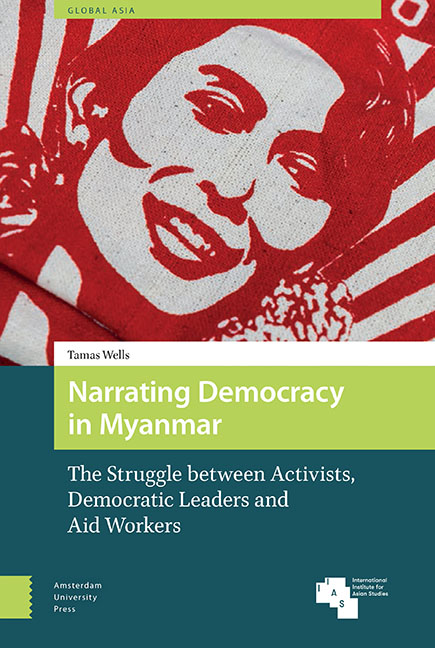Book contents
- Frontmatter
- Contents
- Abbreviations
- Acknowledgements
- Foreword
- 1 Introduction
- 2 Elucidating the Meaning of Democracy through Narrative
- 3 Toward the ‘Ocean of Democracy’?: The British Colonial Administration, the Thakin and Contests over Meanings of Democracy in late Colonial Burma
- 4 Burma after Independence: From Moral to ‘Disciplined’ Democracy
- 5 A liberal Narrative
- 6 A benevolence Narrative
- 7 An Equality Narrative
- 8 Exposing the Political use of Narratives
- 9 Beyond an ‘Ideal type’
- 10 Playing Different Games: Myanmar’s Future Challenges
- Index
- Frontmatter
- Contents
- Abbreviations
- Acknowledgements
- Foreword
- 1 Introduction
- 2 Elucidating the Meaning of Democracy through Narrative
- 3 Toward the ‘Ocean of Democracy’?: The British Colonial Administration, the Thakin and Contests over Meanings of Democracy in late Colonial Burma
- 4 Burma after Independence: From Moral to ‘Disciplined’ Democracy
- 5 A liberal Narrative
- 6 A benevolence Narrative
- 7 An Equality Narrative
- 8 Exposing the Political use of Narratives
- 9 Beyond an ‘Ideal type’
- 10 Playing Different Games: Myanmar’s Future Challenges
- Index
Summary
Abstract
This chapter examines an equality narrative of democracy that was drawn on within some networks of activists, and which was largely a reaction against the benevolence narrative described in the previous chapter. This narrative has three components – the core challenge of hierarchy within Burmese society, a vision of personal or relational equality and a strategy of cultural reform. Proponents of this narrative saw the emphasis on values of unity and obligation within the benevolence narrative, and the implicit hierarchies that these values create, as deeply problematic for the country's democratisation.
Keywords: activism, Myanmar, equality, Aung San Suu Kyi, democracy
In the lead up to the 2015 elections, I sat in the upstairs office of a Burmeselanguage journal publisher, speaking with prominent writer and activist Daw Thandar Win. Thandar Win had written a number of articles about the rapid political transitions in Myanmar. Yet, along with her critique of the role of the military in politics, she was also deeply critical of Burmese political culture, even within the democracy movement itself. She described ‘Burmese thinking’ as ‘locked up’, insisting that new leaders, even those within the NLD, would not be able to solve the inherent problem in Myanmar of relational inequality. If political leaders emphasise the values of unity and obligation, she argued, this simply reinforces an undemocratic culture. Crucially, she suggested that new formal democratic institutions would also fail to treat the core problem, which was seen to be cultural rather than procedural. The primary problem was not the personalised nature of politics, but rather the hierarchical values fostered within that personalised system. These hierarchical values were seen by Daw Thandar Win to be an unresolved obstacle to Burmese democracy.
To this point, my unpacking of meanings of democracy amongst Burmese democratic leaders, activists and international aid workers has emphasised two contrasting ways in which democracy was narrated. In this chapter, I outline an equality narrative of democracy that was drawn on within some networks of activists, and which was largely a reaction against the benevolence narrative described in the previous chapter.
- Type
- Chapter
- Information
- Narrating Democracy in MyanmarThe Struggle Between Activists, Democratic Leaders and Aid Workers, pp. 147 - 168Publisher: Amsterdam University PressPrint publication year: 2021



